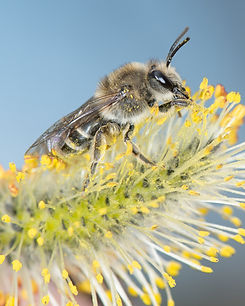
Family Megachilidae > Genus Anthidiellum
Anthidiellum
Resin Bees
In Minnesota, there is one described species within the genus Anthidiellum—Anthidiellum boreale. This species was recently recorded in the state in 2022 by Minnesota Department of Natural Resources bee researchers. In 2024, it was observed in one other location visiting Monarda punctata in a sand prairie. Anthidiellum boreale constructs freeform oblong resin nests with mud or pebble additions, attached to vegetation. The nests are bottle- or vessel-shaped with a downward-facing "neck". Each nest usually contains one brood cell. This bee is robustly shaped but generally smaller than other species in the tribe Anthidini. It has a dark gray or black integument and yellow markings on the head, thorax, and abdomen. The legs and tegulae are red/orange. Both males and females are fast flyers.
Bees in the genus Anthidiellum have a curved subantennal suture, an arolium (pad between the front tarsal claws), and a scutellum that projects like a shelf over the propodeum. They range in length from 5 to 10 mm (0.2 to 0.4 inches).

Anthidiellum boreale visiting Monarda punctata.

wing
position
on flowers

N0. species in MN
1
size range

Phenology


Regional Map
Anthidiellum boreale Wu, 2004 in GBIF Secretariat (2023). GBIF Backbone Taxonomy. Checklist dataset https://doi.org/10.15468/39omei accessed via GBIF.org on 2024-12-20.
Plant
Associations
Monarda punctata
(dotted horsemint)
Amorpha canescens
(leadplant)
Dalea candida
(white prairie clover)
Veronicastrum virginicum
(Culver's root)


Explore More Megachilidae Genera
Note: Two genera/species on the state list are not included in this guide: Ashmeadiella bucconis (last seen in Minnesota in 1949) and Trachusa zebrata (last seen in Minnesota in 1939). If either of these species is rediscovered in the state, they will be added to the guide at that time.
Explore Bee Families

Apidae
15 genera, 133 species
Bumble bees Bombus
Longhorn bees
Epimelissodes, Eucera, Melissodes
Carpenter bees
Ceratina, Xylocopa
Honey bees Apis
Digger bees Anthophora
Cuckoo bees Brachymelecta, Epeolus, Holcopasites, Nomada, Neolarra, Triepeolus
Squash bees Xenoglossa

2 genera, 39 species
Halictidae
10 genera, 134 species
Metallic green sweat bees
Agapostemon, Augochlora, Augochlorella, Augochloropsis
Large sweat bees
Dieunomia, Nomia
Short-faced bees Dufourea
Sweat bees Halictus
Small sweat bees Lasioglossum
Cuckoo (blood) bees Sphecodes
Megachilidae
14 genera, 86 species
Resin and pebble bees Anthidiellum, Dianthidium, Heriades, Paranthidium
Carder bees Anthidium, Pseudoanthidium
Mock orange bees Chelostoma
Mason bees Osmia, Hoplitis
Leafcutter bees Megachile
Sharp-tailed cuckoo bees Coelioxys
Dark cuckoo bees Stelis

Citations and Further Reading
Droege, S., et al. (2024). The Very Handy Bee Manual: 2.0. How to Catch and Identify Bees and Manage a Collection.
Gibbs, J., Hanuschuk, E., Miller, R., Dubois, M., Martini, M., Robinson, S., ... & Onuferko, T. M. (2023). A checklist of the bees (Hymenoptera: Apoidea) of Manitoba, Canada. The Canadian Entomologist, 155, e3.
Mitchell, T. B. (1960). Bees of the eastern United States. Technical Bulletin No. 141. North Carolina Agricultural Experiment Station.
Packer, L., Genaro, J. A., & Sheffield, C. S. (2007). The bee genera of eastern Canada. Canadian Journal of Arthropod Identification, 3(3), 1-32.
Portman, Z. M., Gardner, J., Lane, I. G., Gerjets, N., Petersen, J. D., Ascher, J. S., ... & Cariveau, D. P. (2023). A checklist of the bees (Hymenoptera: Apoidea) of Minnesota. Zootaxa, 5304(1), 1-95.
Wilson, J. S., & Messinger Carril, O. J. (2016). The bees in your backyard: a guide to North America's bees. Princeton University Press.

















